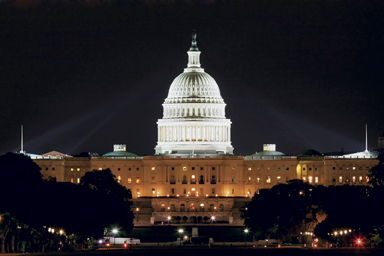Public Policy Analysis & Opinion
Trump proposal for interstate insurance sales threatens the foundations of a business based on trust
As Murray D. Lincoln, founder of the Nationwide Mutual Insurance Companies, often reminded audiences, it is vital for any institution or organization to maintain knowledge of “fundamental principles.” Perhaps Lincoln’s observation holds particular importance for the business of insurance, which traffics in risk and is based on public trust.
It is difficult to enact rules on commerce in the United States; therefore, a thoughtful observer can review history and usually find a widespread scandal at the foundation of every regulatory framework.
In the years after the Civil War, leading life insurance companies rolled out an aggressive marketing strategy to sell an investment-oriented product. That strategy depended on hooks and crooks employed by “Lightning Agents.”
Companies introduced the deferred dividend product just before the war but did not push the product until after the Union troops put down the rebellion. The policies generated relatively large premium payments that over a long period the companies used for financial speculation.
Companies like New York Life decided to expand the target market for the deferred dividend products to new markets. The company learned from watching how Jay Cooke & Company sold U.S. war bonds.
Jay Cooke & Company rejected a strategy established by John Jacob Astor to fund the War of 1812. The Astor strategy focused on an underwriter purchasing a government bond issue at a discount and reselling large blocks of those obligations to a small number of institutions at a market price. Jay Cooke & Company used corps of sales representatives to sell small numbers of Civil War federal bonds to a large market of well-off but not wildly wealthy individuals across the Northern states.
Life insurers constructed a network of sales personnel across the country; and in an effort to get to the proverbial low-hanging fruit first, the carriers also appointed agents authorized to move across the country, known as Lightning Agents.
Unquestionably, the Lightning Agent system changed the competitive environment in life insurance sales. Most local agents traditionally employed sales practices that recognized a long-term relationship with the sales lead. Local agents lived in the same community, shopped at the same stores, and patronized the same institutions as their customers. This is not to say that the local agent was not capable of sharp dealing, but the successful local agent did not become known for taking advantage of neighbors.
By definition, the Trump proposal creates a system where one state regulates on behalf of all jurisdictions.
The Lightning Agent hailed from a different breed, who came from outside the community, made a few large-dollar sales, and left the scene. The Lightning Agent system ginned up short-term competition in ways that destroyed long-term trust in a wide range of insurance products, which the local agent then had to explain.
The style of competition unleashed by the Lightning Agents rewarded consumer abuses. The sales personnel who rebated to high-dollar customers at the expense of premiums charged to less well-off customers proved more competitive in the market. Also, the Lightning Agents misrepresented products or engaged in “twisting” existing policyholders into purchasing new policies and generating new commissions—without regard for the policyholders’ financial interest. Furthermore, because the Lightning Agents targeted the cream of local markets, some of the most influential and powerful members of local communities developed a distrustful view of the business of insurance.
Among the most colorful of the Lightning Agents were the Dinkelspiel brothers, as recounted by H. Roger Grant in Insurance Reform: Consumer Action in the Progressive Era. In the 1880s, Sam and William Dinkelspiel specialized in courting small-town, well-to-do prospects. They would hit the town and lavish their targets with gifts and good times—charged back at the Saratoga racetrack. When Sam Dinkelspiel left New York Life in 1887 he owed the company $348,000.
The story of the Dinkelspiel brothers and the history of the Lightning Agents provide a dystopian description of unfettered competition in the business of insurance as the cult movie Death Race 2000 provides a blueprint for American transportation policy.
Industry backlash
Local life insurance agents responded to the threat of the Lightning Agent by forming city, state, and national associations designed to foster professional codes of conduct and support regulatory reform. The National Association of Life Underwriters (NALU), now the National Association of Insurance and Financial Advisors, was formed in 1890 as a federation of life agent groups established in the 1870s in Cincinnati, Cleveland, and Pittsburgh. The NALU championed state legislation aimed at outlawing rebating and the Lightning Agent.
Insurers also acted to clean up the abuses associated with deferred dividend policies and Lightning Agents. New York Life promoted George Perkins, the son of a life insurance agent, to its senior man-
agement team. In the 1890s, Perkins built a life insurance sales framework that placed strict controls on “company agents.” Some financial historians still refer to Perkins’ framework as “The American Agency System.” In 1899, Perkins became a partner of the Morgan Bank.
A major tenet of the healthcare plan described by Donald Trump’s campaign for the presidency calls for the sale of health insurance across state lines, unhindered by local regulatory oversight.
The formal policy proposal can be found on www.donaldjtrump.com. It states: “Modify existing law that inhibits the sale of health insurance across state lines. As long as the plan purchased complies with state requirements, any vendor ought to be able to offer insurance in any state. By allowing full competition in this market, insurance costs will go down and consumer satisfaction will go up.”
Unfettered competition
Unfettered competition may increase marketing costs, reduce quality, and diminish public satisfaction—and public trust. We may dream of the Magic of the Marketplace; but too often, without an agreed-upon set of rules, all we experience are Dark Arts.
If Congress decides to adopt this proposal and “let competition regulate,” it also should remove the health insurance sector from the McCarran-Ferguson Act’s limited and contingent exemption
from federal antitrust laws and fair trade enforcement. Unregulated insurance should not receive special treatment.
Deregulating insurance and applying antitrust oversight in its place ignores history. Congress passed McCarran-Ferguson based on the belief that insurance was too complex for the public to make the informed choice necessary to foster competitive markets. Without affirmative regulatory review by the several states, this complexity still undermines competitive markets.
In the absence of affirmative rules, the shoddy-product, sharp-dealing marketers prove to be “more competitive” in the short term. Then they leave. When the underlying value of the product and transaction become apparent to consumers, it is too late for “competition” to apply positive pressure on the market. Local producers operating under reasonable rules—after losing the initial competitive contest—face the daunting task of rebuilding public trust.
Havens
“As long as the plan purchased complies with state requirements” is a phrase that begs examination. It does not say “the state jurisdiction where the sale is made,” so one must assume that the proposal means any state.
This proposal invites the establishment of “haven” jurisdictions where legislatures will gut the regulatory framework to attract fees and tax revenue. “The haven effect” appears in the credit card sector (South Dakota) and business incorporation (Delaware), among others.
Under a “complies with state requirements” test, disreputable carriers or producers will need only to register in one of these havens, then comply with whatever low bar is set for regulation, and then attack your book of business.
It is possible that state officials will join a death spiral of regulation cutting to counter the “haven effect” on local producers and carriers. If that happened, public trust in the business of insurance also would enter a death spiral.
It is important to note that the Trump proposal is not innovative, and it has never proved to be convincing in state capitals. Also, although Senator John McCain has advocated a similar proposal for years, the concept has never gained traction.
The Independent Insurance Agents and Brokers of America does not have a formal position on this concept, which should serve as a measure of how far outside the mainstream the proposal has been until now.
In 2006, the National Association of Insurance Commissioners spoke out against a “sell across state lines” proposal. The NAIC offered the following arguments:
The concept disadvantages higher-risk individuals and removes critical consumer protections.
The concept creates an unlevel playing field where some constituents are protected by states’ laws and some are not.
The concept undercuts the authority of governors, state legislators, and insurance regulators.
In this last bullet point, the concept shows contempt for democracy. The concept runs counter to America’s theory of self-government.
Theory aside, the Trump proposal for health insurance sales across state lines runs counter to the provisions of the McCarran-Ferguson Act, its legislative history, and jurisprudence. As a result of this conflict, if Congress chose to accept the proposal, it would have to amend or repeal McCarran-Ferguson.
By definition, the Trump proposal creates a system where one state regulates on behalf of all jurisdictions. Even if one assumes that this arrangement can serve the public interest, it conflicts with settled law. The Congressional conference committee that crafted agreement on the McCarran-Ferguson Act put it this way: “Nothing in the proposed law would authorize a State to try to regulate for other States, or authorize any private group or association to regulate in the field of interstate commerce” (91 Cong. Rec. 1483). The Supreme Court cited this statement in its opinion in Federal Trade Commission vs. Travelers Health Association (1960).
If health insurance sales take place over state lines without state-by-state action, the limited and contingent exemption from federal antitrust laws will not apply to the business of insurance, even under the McCarran-Ferguson Act; therefore, aggrieved individuals whose states did not regulate the health insurance transaction could seek relief under the federal antitrust laws.
This folly could get expensive on many levels.
The author:
Kevin P. Hennosy is an insurance writer who specializes in the history and politics of insurance regulation. He began his insurance career in the regulatory compliance office of Nationwide Insurance Companies and then served as public affairs manager for the National Association of Insurance Commissioners. Since leaving the NAIC staff, he has written extensively on insurance regulation and has testified before the NAIC as a consumer advocate.






